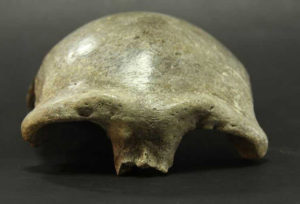 According to a statement released by the Max-Planck Institute for
According to a statement released by the Max-Planck Institute for
Evolutionary Anthropology , a team of researchers from the institute and the Mongolian Academy of Sciences has analyzed a genome extracted from a 34,000-year-old fossil
discovered in 2006 in eastern Mongolia’s Salkhit Valley. The unusual skullcap had been
thought to belong to a Neanderthal or a Homo erectus individual, but the genetic study has shown that the remains belonged to a modern human woman. About 25 percent of her genetic material had been inherited from western Eurasians, who may have come from Siberia. She also carried DNA from Denisovans, who inhabited Asia before the arrival of modern humans, and Neanderthals. Diyendo Massilani of the Max-Planck Institute said that the study suggests that populations living across Eurasia frequently migrated and interacted with each other at least 35,000 years ago. The Denisovan DNA fragments in the ancient genome overlap with those found in today’s East Asians, he added, and yet are different from those found in people who currently live in Oceania. This indicates that modern humans and Denisovans are likely to have mixed multiple times















